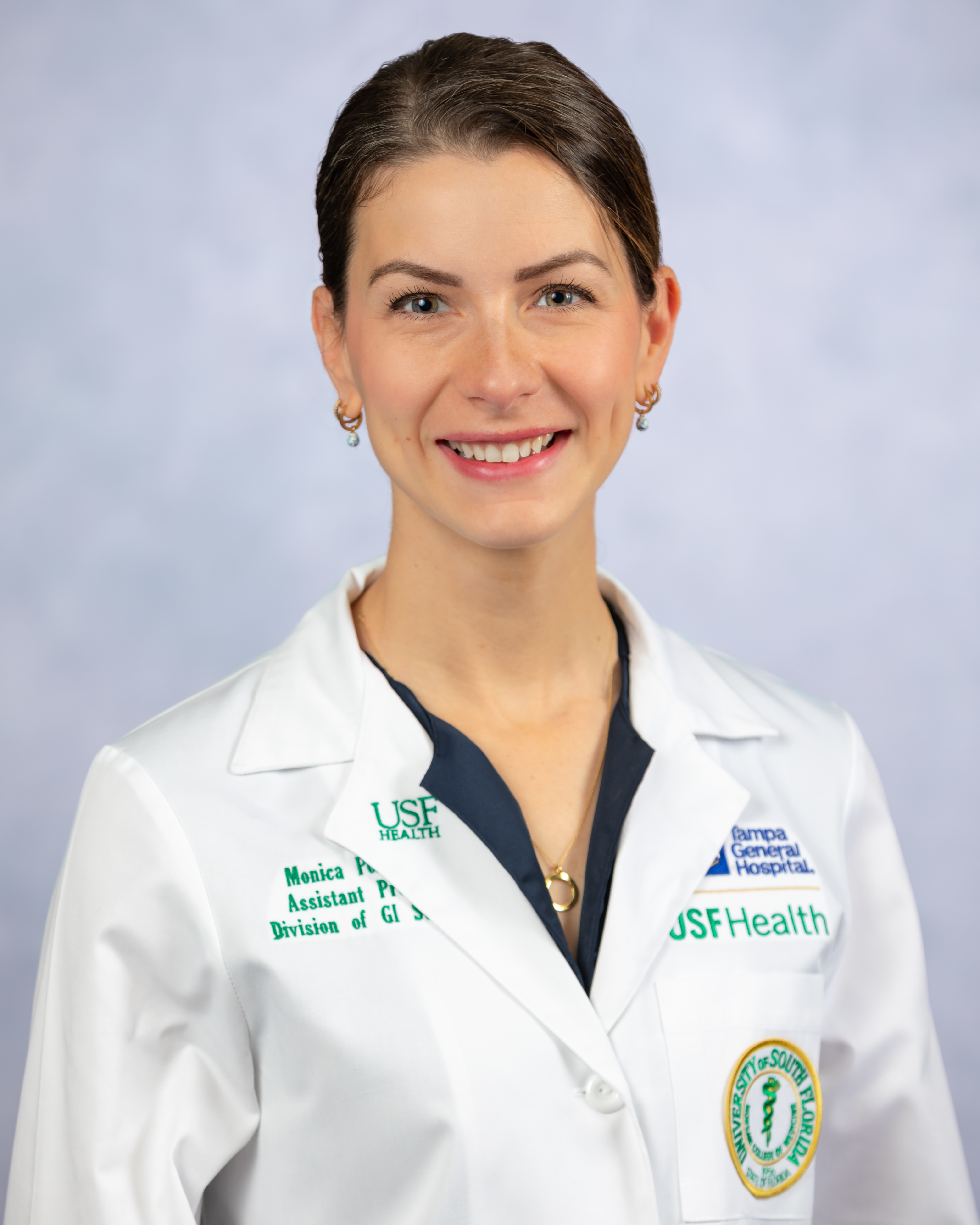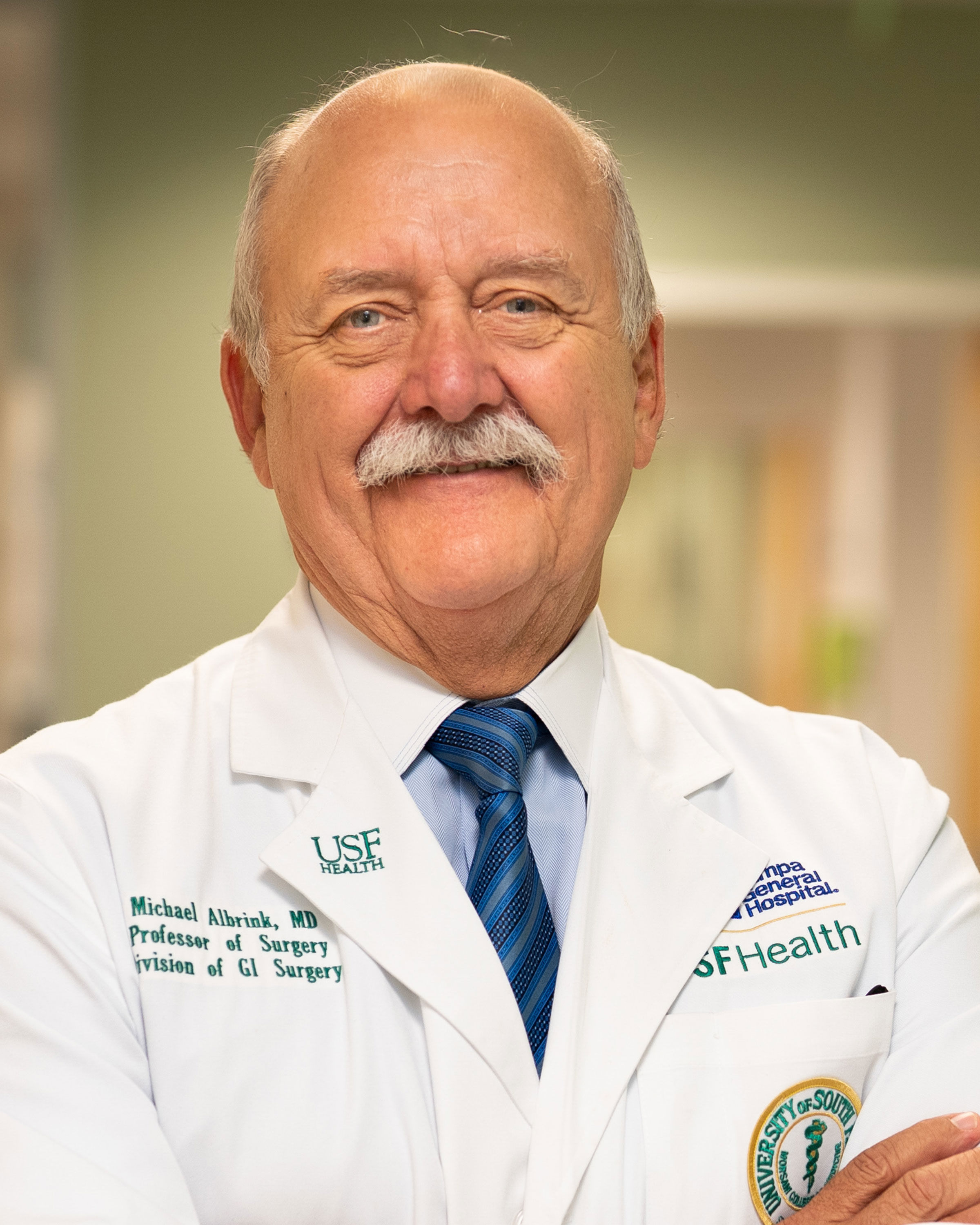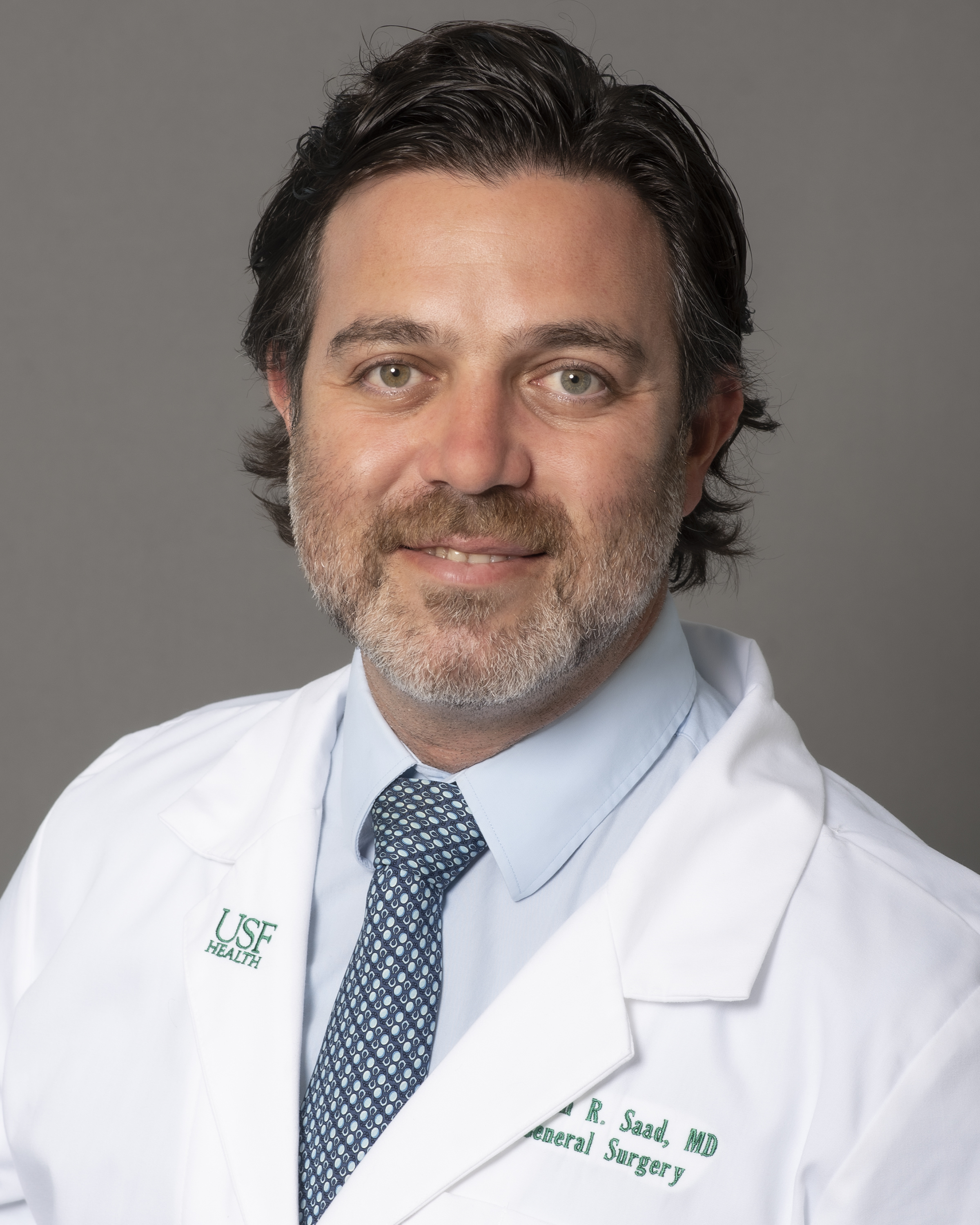Tampa General Hospital’s Center for Abdominal Wall Surgery and Complex Hernia Repair is a premier destination for patients with the most severe and complex abdominal wall conditions. From the patient’s perspective, choosing our center means choosing a team that specializes in cases others often turn away. We proudly serve as a high-risk referral center, offering hope and advanced care to individuals who have been told, “we can’t help you.” Our goal is to become the premier hernia and abdominal wall center of excellence in the United States.
Our team of four expert surgeons, two of whom have specialized expertise in complex differential abdominal wall reconstruction—are all highly trained in managing the most challenging hernia cases. We specialize in minimally invasive and robotic-assisted procedures, as well as clinical research and clinical trials involving advanced robotics and new types of mesh. Our approach addresses a wide range of conditions, including obesity-related hernias, chronic pain, and fistulas. We also offer the patient the best opportunity for a successful repair through optimization programs, such as weight loss prior to surgery and innovative optimization treatments, such as Botox injections that relax the abdominal wall. We are also happy to evaluate and treat patients who have undergone multiple failed hernia repairs in the past.
What sets us apart is not only our surgical expertise but also our commitment to personalized, multidisciplinary care. We accept referrals from community physicians, surgeons, and surgical oncologists, and welcome self-referred patients. Our center is deeply involved in research and academic contributions, continuously advancing the field through publications and clinical trials.
Complex Hernia Care
About Hernias and Other Abdominal Wall Conditions
Your abdominal wall is a strong, multi-layered structure made up of skin, fat, connective tissue (fascia), and muscle. Together, these layers form a supportive barrier that holds your internal organs in place while allowing your body to move, breathe, and function normally.
A hernia occurs when there’s a weakness or opening in this abdominal wall, allowing part of an internal organ—most often the intestine or fatty tissue—to push through. This can appear as a noticeable bulge under the skin or may simply cause discomfort, pressure, or pain that worsens when you cough, strain, or lift something heavy.
Hernias can occur in different parts of the body, including the groin (inguinal or femoral hernias), around the belly button (umbilical hernia), near a previous surgical incision (incisional hernia), or in other, less common locations. While some hernias are small and cause minimal symptoms, others can grow larger over time or lead to complications if the trapped tissue loses its blood supply—a serious condition known as incarceration or strangulation that requires emergency surgery.
There are many reasons why hernias develop. Some people are born with a natural weakness in their abdominal wall, while others acquire one over time. Factors that increase the risk include:
- Previous abdominal surgery – scar tissue may create weak spots
- Aging – natural weakening of muscles and connective tissue
- Chronic coughing or constipation – frequent straining can stress the abdominal wall
- Heavy lifting – increases pressure inside the abdomen
- Obesity – excess weight adds constant pressure to the abdominal wall
- Pregnancy – stretches and thins the abdominal muscles
- Smoking – impairs tissue healing and promotes chronic cough
- Trauma or injury – can damage the muscle or fascia layers
If left untreated, a hernia can lead to chronic pain, difficulty performing daily activities, or serious complications such as bowel obstruction or tissue death.
At our surgical clinic, we specialize in diagnosing and treating all types of hernias—from simple to complex abdominal wall reconstructions. Our team uses the latest minimally invasive and robotic-assisted techniques to repair hernias safely and effectively, helping patients recover faster and return to normal activities with less pain and a lower risk of recurrence.
If you’ve noticed a new bulge, persistent discomfort, or changes around a prior surgical site, it’s important to be evaluated. Early consultation allows us to identify the cause, discuss your options, and create a personalized treatment plan tailored to your health and lifestyle.
Why Choose TGH
Multidisciplinary Approach to Care
The multidisciplinary team in TGH’s Center for Abdominal Wall Surgery and Complex Hernia Repair includes numerous specialists who share the sole purpose of ensuring a positive surgical outcome for each patient. As needed, we collaborate closely with experts in other medical disciplines, including anesthesia, bariatric surgery, colorectal surgery, nutrition, pain management, physical therapy, plastic surgery, radiology, surgical oncology and urology. In this way, we provide comprehensive, personalized care.
Abdominal Core Health Quality Collaborative (ACHQC) Membership
Our center is dedicated to delivering the most advanced, evidence-based hernia repair treatments. As part of this commitment, we are proud members of the Abdominal Core Health Quality Collaborative (ACHQC), a non-profit research organization that collects and analyzes data on hernia repairs and abdominal core health outcomes. By collaborating with academic medical centers nationwide, ACHQC uses this data to drive research that informs and enhances future surgical practices. Our physicians actively contribute to this field, having published hernia-focused research in respected peer-reviewed journals.
Advanced Surgical Technology
TGH’s Center for Abdominal Wall Surgery and Complex Hernia Repair is committed to utilizing and incorporating the most advanced surgical techniques and technologies available today. One example is the da Vinci Surgical System, a state-of-the-art robotic-assisted surgical platform designed to enhance the surgeon’s precision, control and visualization during minimally invasive surgery. Developed by Intuitive Surgical, this advanced system allows our surgeons to perform complex procedures with the assistance of a console-controlled robotic system equipped with miniaturized instruments and a high-definition, three-dimensional (3D) camera. The da Vinci System translates the surgeon’s natural hand movements into precisely scaled movements of thin robotic arms, which can bend and rotate beyond the capabilities of the human hand. This technology enables smaller incisions, less blood loss and a faster recovery compared to traditional open surgery.
Expert Surgeons
Advanced surgical technologies, such as robotic-assisted systems, are revolutionizing the field of surgery. However, in terms of optimizing the surgical outcome, the true difference lies in the skill and expertise of the surgeon behind the robotic console. No technology can replace the critical decision-making, refined technique and in-depth experience that a highly trained surgeon brings to the operating room. At TGH, our specialists combine cutting-edge technology with advanced surgical proficiency to ensure the best possible outcome and quality of life for every patient we treat.
Our Team
Conditions Treated
The multidisciplinary team in TGH’s Center for Abdominal Wall Surgery and Complex Hernia Repair offers the latest treatment options for all types of hernias, including:
- Enterocutaneous fistula with hernia – An abnormal connection forms between the small or large intestine and the skin, often within a hernia sac.
- Incarcerated hernia – Fatty tissue or a section of the small or large intestine becomes trapped within a hernia sac and cannot be pushed back into place.
- Incisional hernia – A hernia develops at the site of a previous surgical incision due to weakened abdominal muscles.
- Incisional hernia with fistula formation – A hernia and fistula form at a surgical incision site.
- Inguinal hernia – A bodily tissue or organ protrudes through a weak spot in the lower abdominal wall, creating a bulge in the groin area.
- Lumbar, obturator and flank hernias – Tissue pushes through the abdominal wall in the lower back, pelvis or side of the abdomen.
- Obesity with hernia – A hernia develops in an individual with a body mass index (BMI) of 30 or higher, which can make surgical repair more challenging and raise the risk of recurrence.
- Parastomal hernia – A hernia forms around a stoma or ostomy.
- Recurrent hernia – A hernia redevelops after surgical repair.
- Spigelian hernia – A hernia occurs along the Spigelian fascia, a weak transition point in the lower abdominal wall where muscle fibers give way to connective tissues.
- Strangulated hernia – After fatty tissue or a portion of the small or large intestine becomes trapped within a hernia sac, blood flow to the trapped tissue is restricted, potentially leading to tissue death (a medical emergency).
- Umbilical hernia – Part of the small or large intestine presses through a weak spot in the abdominal muscles near the navel.
- Ventral hernia – A hernia develops at the front of the abdominal wall (belly area), such as an incisional or umbilical hernia.
In addition to hernias, we treat other abdominal wall conditions, including:
- Chronic pain in the groin or abdominal wall after hernia repair – Due to nerve irritation or scar tissue formation, persistent pain may develop after hernia surgery.
- Rectus diastasis with hernia – The abdominal muscles can separate along the midline after pregnancy or a significant change in body weight.
Treatment Options
The experienced surgeons in TGH’s Center for Abdominal Wall Surgery and Complex Hernia Repair have undergone extensive training in complex hernia repair, with some having completed advanced fellowships in abdominal wall reconstruction. These highly skilled professionals perform the latest techniques in abdominal wall surgery, utilizing robotic-assisted, laparoscopic, open, component separation and extended totally extraperitoneal repair (eTEP) approaches as appropriate.
Our multidisciplinary team can also assist patients who are living with chronic pain stemming from prior hernia surgery. Our pain management options range from conservative therapies, such as medications, nerve injections and Botox® to relax the abdominal wall, to surgical interventions, such as nerve resections.
Support Services
In addition to providing the most advanced surgical approaches to hernia treatment, TGH’s Center for Abdominal Wall Surgery and Complex Hernia Repair offers a full range of supportive care services. We thoroughly evaluate each patient’s medical history, surgical history, imaging scans, post-operative goals and need for preoperative optimization and postoperative recovery services before developing a tailored care plan.
The first step toward a successful surgical outcome is ensuring the patient is in the best possible health before the procedure. To that end, we offer comprehensive preoperative optimization services, including:
- Cardiopulmonary optimization – Evaluations and interventions to improve heart and lung function, which is especially important for patients with preexisting cardiovascular conditions
- Diabetes and blood sugar control – Monitoring and optimizing glucose levels to minimize infection risk and support wound healing
- Medical evaluation and risk assessment – A comprehensive health assessment to identify and address any underlying conditions that could affect the surgery
- Medication management – Adjustments to medications, such as temporarily stopping drugs that may impact bleeding, immune response or anesthesia tolerance
- Nutritional counseling – Individualized guidance on a balanced diet to promote healing, strengthen the immune system and manage weight
- Patient education and surgical preparation – Information about the procedure, postoperative care and recovery expectations
- Physical conditioning and core strengthening – Prehabilitation exercises to enhance strength, flexibility and overall fitness before surgery
- Preoperative imaging and diagnostics – Tests such as computed tomography (CT), ultrasound and magnetic resonance imaging (MRI) scans to help the surgeon assess the hernia and surrounding structures
- Psychological support and counseling – Resources to help manage anxiety, stress and concerns about surgery and recovery
- Smoking cessation support – Programs to help the patient quit smoking, which is essential when preparing for surgery because tobacco use can impair healing and increase surgical risks
- Weight management programs – Assistance with achieving a healthy body weight to reduce strain on the abdominal wall and improve the surgical outcome
Likewise, our postoperative recovery services are designed to ease the healing process and reduce the risk of surgical complications. These include:
- Activity modification guidance – Instructions on lifting restrictions, movement limitations and gradual return to normal activities
- Drain and suture removal – Follow-up care to remove surgical drains or sutures as needed
- Follow-up appointments – Regular visits with the surgeon to monitor progress and address any concerns
- Infection prevention and monitoring – Assessment for signs of infection or complications, such as fever, swelling and drainage
- Hernia prevention education – Guidance on lifestyle changes, such as weight management and core strengthening, to reduce the risk of hernia recurrence
- Nutritional support – Dietary recommendations to aid recovery and promote healthy weight management
- Pain management – Medications and therapies to control discomfort and support healing
- Physical therapy – Guided exercises to restore mobility, strengthen the core and prevent complications
- Supportive wear – Compression garments and abdominal binders to reduce swelling and enhance healing
- Wound care – Incision monitoring and dressing changes to prevent infection and ensure proper healing
Research and Clinical Trials
The scientists and clinicians in TGH’s Center for Abdominal Wall Surgery and Complex Hernia Repair are committed to advancing the field through extensive research and clinical trials. We actively participate in studies aimed at improving surgical techniques, optimizing patient outcomes and reducing complications associated with complex hernia repair and abdominal wall surgery.
Our current research efforts are focused on key areas such as advanced robotic-assisted procedures, biologic and synthetic mesh materials and strategies for minimizing hernia recurrence rates in high-risk patients. We also collaborate with national and international research networks to evaluate new treatment approaches, enhance postoperative recovery protocols and refine best practices in abdominal wall reconstruction. Through these important initiatives, TGH remains at the forefront of surgical innovation, providing patients with access to the most up-to-date, evidence-based treatment options for hernias and other abdominal wall conditions.
In recent years, medical advancements have led to steady improvements in hernia repair outcomes for nonobese patients. However, the rising prevalence of obesity has resulted in a growing number of hernia patients who face additional surgical risks. To address these challenges, TGH’s Center for Abdominal Wall Surgery and Complex Hernia Repair offers a staged treatment approach in collaboration with the TGH+USF Health Bariatric Center. This strategy begins with a comprehensive weight loss evaluation that includes nutritionists, bariatric medicine, and bariatric surgery to support significant weight loss. Once the patient achieves their weight loss goals—typically within six to 12 months—they proceed with complex hernia repair, improving both the surgical outcome and long-term recovery.





